The European Union's anti-fraud office OLAF has asked the European Parliament to begin proceedings to recover hundreds of thousands of euros paid to France's far-right leader Marine Le Pen in her capacity as an MEP, Mediapart and news magazine Marianne can reveal. The Front National (FN) president will be asked to pay back 339,000 euros paid in relation to the employment of two parliamentary assistants, amid claims that these assistants were involved more with party duties than work linked to Le Pen's responsibilities as an MEP. Under EU rules assistants paid for by the European Parliament must perform work “directly linked to the exercise of a Member’s parliamentary mandate”. Le Pen is launching two appeals against the claim.
In a separate development the Front National also faces a broader-ranging criminal investigation in France into claims that a number of parliamentary assistants at the European Parliament were in reality carrying out FN party duties. On July 26th OLAF sent its “administrative investigation report” to the French justice system; since March 2015 prosecutors in Paris have been probing salaries paid to FN European parliamentary assistants after July 2014. Based on this report the Paris prosecution service has now extended its preliminary investigation into “breach of trust” to events covering the period 2010 to 2016.
The claim is that the FN has effectively been using European Parliament money to help fund the running of its own organisation.
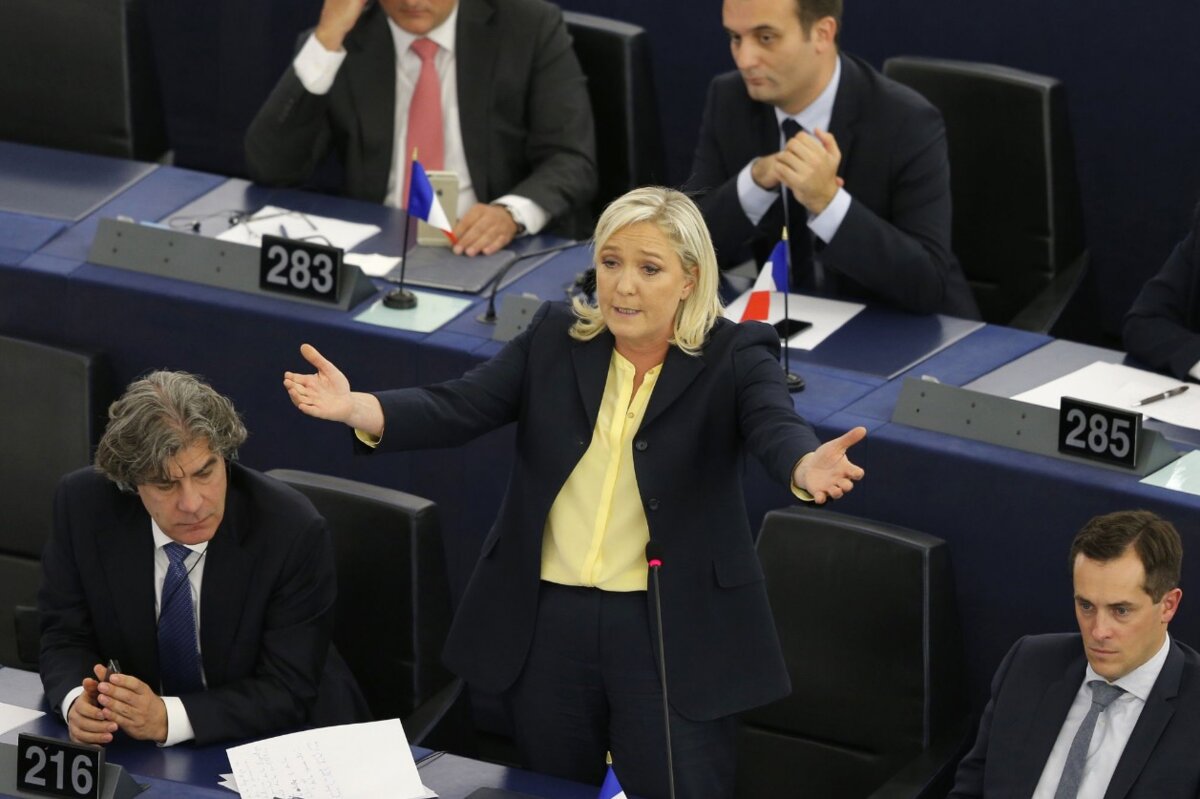
Enlargement : Illustration 1

It was at the end of July that Marine Le Pen received a letter from OLAF about the EU payments made in relation to two parliamentary assistants. The European Anti-Fraud Office, as it is officially known, estimates that some 339,000 euros were “wrongly” paid to her for those assistants. Then, at the end of September, Le Pen received a second letter, this time from the European Parliament's secretary general Klaus Welle. In it Welle demanded explanations from the French MEP and proof of the work carried out by her two assistants. Marine Le Pen had a month to respond but sent nothing to the Parliamentary official. “Basically, we don't have OLAF's report, what would you like us to discuss [with the Parliamentary administration]?” asked lawyer Marcel Ceccaldi representing Marine Le Pen, who herself declined to comment to Mediapart.
In mid-October Ceccaldi wrote to OLAF and the European Parliament asking for the report to be sent to Marine Le Pen. “I've had no response,” said the lawyer, who added that OLAF had previously launched an initial inquiry in June 2014. “OLAF starts its investigation in March 2016 and concludes it in July 2016, just before the start of the [French] presidential campaign,” said Marcel Ceccaldi. “And its director is promoted to the European Commission four weeks later! Marine Le Pen has never been spoken to. This is preposterous, it's a deliberate violation of the rule of law, an operation staged by the Parliament's German executive to muzzle those who are critical of the way the European Union works.”
If Marine Le Pen does not respond the Parliament will ask her to repay the 339,000 euros either directly or by taking the money from her payments as an MEP, under article 68 of EU rules on the issue. The FN leader does have several legal options available, however, including ultimately taking the case to the European Court of Justice.
In fact, Marcel Ceccaldi is preparing two emergency proceedings “against the general secretariat and OLAF” under European law and will hold a press conference in Brussels with Le Pen's Belgian lawyer Ghislain Dubois within the next two weeks. “We're going to put everything on the table: the Parliamentary executive's methods and those of OLAF, whose independence is a farce, but more broadly the question of the EU's functioning. We're going to use the rule of law to oppose their practices,” said Ceccaldi.
OLAF is the EU's anti-corruption agency and take up cases on its own initiative or at the request of a member state or a European institution. It then sends its conclusions to the parties involved and the competent national authority if it thinks that proceedings are justified.
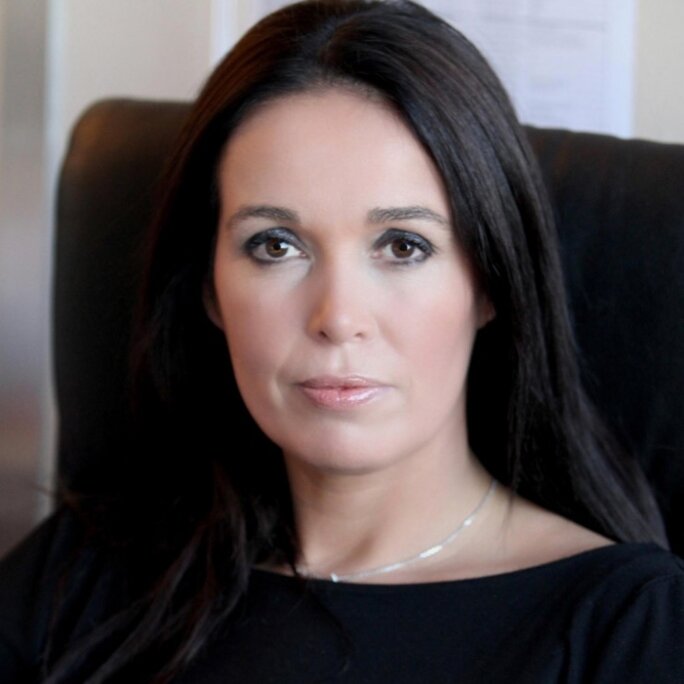
Enlargement : Illustration 2

In the spring of 2016 it started to look into the situation of Marine Le Pen's two assistants, Catherine Griset and Thierry Légier. Griset is an old friend of Le Pen and her former sister-in-law, and between 2010 and 2016 was her full-time accredited parliamentary assistant; in other words she was supposed to work inside the Parliament, which is based in Brussels and Strasbourg. However, she was at the same time head of the FN president's secretariat, then her chief of staff at the party's headquarters at Nanterre, near Paris.
Catherine Griset has told Le Parisien newspaper that she was able to reconcile the two roles “thanks to teleworking”, without stating whether she was paid two salaries or if the European Parliament covered her work at the FN headquarters. At the start of 2016 she became a simple 'local' assistant, in other words one based in the constituency. As of Friday October 28th, she no longer features on the list of Marine Le Pen's staff on the Parliament's website.
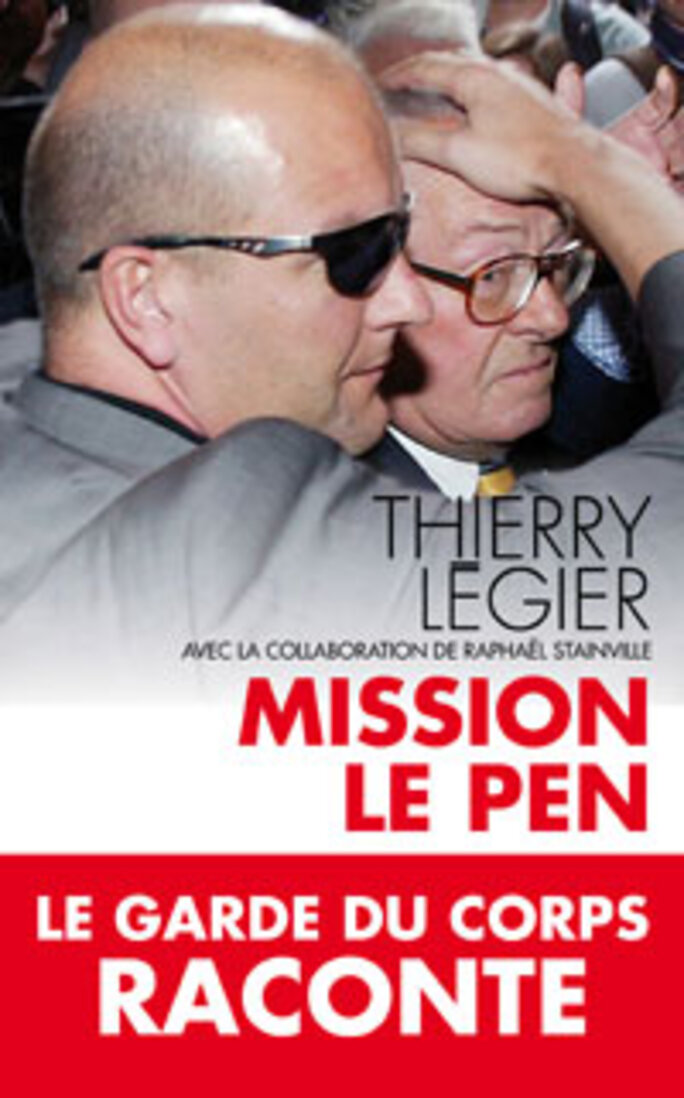
Thierry Légier, meanwhile, was Le Pen's 'local' assistant for three months at the end of 2011 during the MEP's previous term of office. For the last 20 years this six-feet two-inch former paratrooper has protected first the FN's founder Jean-Marie Le Pen and more recently his daughter Marine Le Pen. He was also elected as a regional councillor in Normandy in northern France in 2010. “The work carried out by assistants doesn't just have to be legislative, it's general work involving reports, the media, messages from the constituency,” said Marcel Ceccaldi.
After the publication of this article OLAF told Mediapart that it could “not comment at this stage” on the affair. But it did confirm that in July 2016 it had completed an “investigation linked to a possible wrongful use by the Front National of European funds dedicated for Parliamentary assistance”. OLAF also confirmed that it had “sent its final report containing financial recommendations to the European Parliament, so that all the European funds wrongly paid might be returned to the EU budget” and is “monitoring closely the actions taken following its recommendations”. The organisation says it has “closely cooperated” with the French judicial system, for example by “helping French detectives to carry out several searches in offices and private homes linked to the Front National” as part of the ongoing investigation in France.
The European Parliament has not responded to Mediapart's questions about the demand for repayment. The Parliament's president Martin Schulz did not want to comment and referred Mediapart to the media relations department who said that “the Parliament does not want to respond at this stage”.
Judicial haziness
It is not the first time that Marine Le Pen's use of European funds has attracted the Parliament's attention. In July 2012 its financial services unit questioned the FN president about the hiring of two of her assistants, Louis Aliot and Florian Philippot, as Mediapart revealed at the time. The MEP had employed them as part-time 'local' assistants in the middle of a campaign while they were at the same time vice-presidents of the party plus also directors of Le Pen's presidential campaign and later spokesmen for the FN's Parliamentary election campaign.
At the time the Parliament saw fit to remind Martine Le Pen that under article 43 of the relevant EU rules any money paid to finance parliamentary assistants “may not be used directly or indirectly ... to finance contracts concluded with Parliament’s political groups or political parties”. The MEP responded in a letter: “The modest hourly duration of their parliamentary assistance contracts allowed their two political activities to be reconciled.” In the end the Parliament declined to go through the two men's diaries, judging that the FN president benefited from a certain judicial haziness over the category of a 'local' assistant.
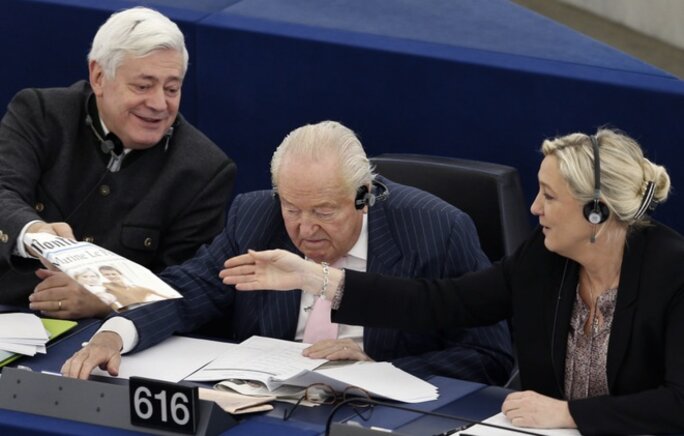
Enlargement : Illustration 4

Nor is Marine Le Pen the only senior Front National figure facing a demand to pay back money. In January the European Parliament demanded 320,000 euros back from her father, FN founder and MEP Jean-Marie Le Pen, and 270,000 euros from senior FN MEP Bruno Gollnisch who from 2009 to 2014 employed Jean-François Jalkh, the party's vice-president, and Guillaume Lhuillier, Jean-Marie Le Pen's chief of staff, respectively. In its letter to Jean-Marie Le Pen the Parliament's general secretariat pointed out that “for the entire [Parliament] Monsieur Le Pen furnished neither explanation nor proof of the parliamentary assistant work carried out by Monsieur Jalkh.”
“There's been a definite climate for a year, you see it with the affair of the assistants, the European Parliament is demanding an astronomical sum and it's legally enforceable,” Le Pen's advisor Lorrain de Saint-Affrique complained when interviewed by Mediapart in June. “There are the financial orders, the preliminary investigation [editor's note, into Jean-Marie Le Pen's assets], the searches and OLAF.”
Meanwhile Bruno Gollnisch attacked what he described as a “political and persecutory procedure” and declared: “I, who was a relatively economical MP, have decided to spend all of my expense allowance from now on!” Both MEPs have appealed to the European Court of Justice. According to Marcel Ceccaldi, three other FN MEPs are also being targeted: Sophie Montel, Dominique Bilde and Mylène Troszczynski.
It was the publication of the Front National's organogram in February 2015 that alerted the European Parliament to a potential problem with the party's MEPs and their assistants. By cross-referencing this document with the assistants' contracts the Parliament's officials discovered that out of 82 people occupying official functions in the FN setup, 20 worked for MEPs, four of them as full 'accredited' assistants and 16 locally. Ten of the 20 gave the FN's headquarters in Nanterre as their address on their work contracts, as did nine other FN parliamentary assistants who did not feature on the organogram. That means that the status of up to 29 FN European Parliament assistants – out of a total of 63 – were potentially a problem as far as the parliamentary authorities were concerned.

Enlargement : Illustration 5
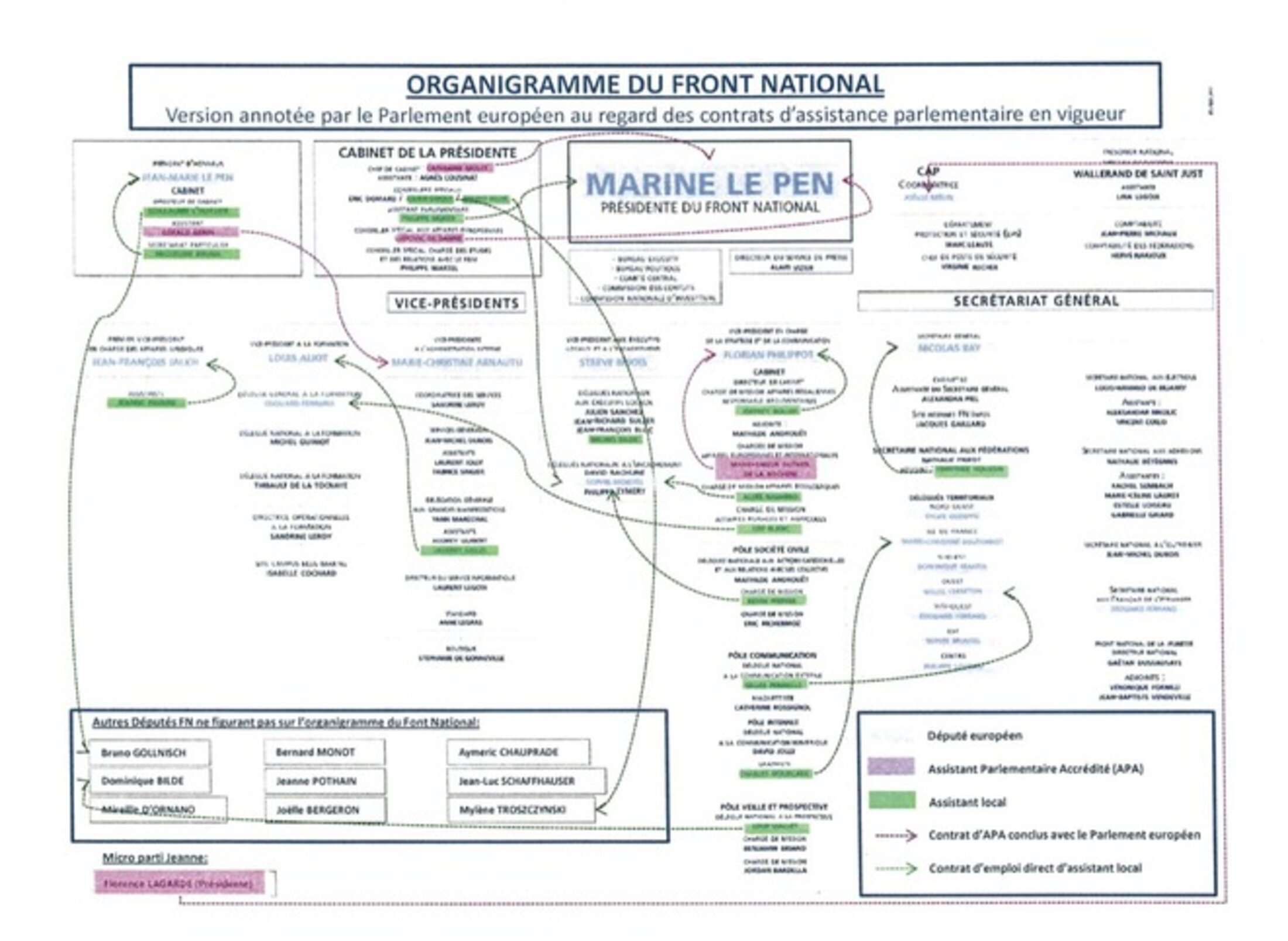
It was these figures that led the president of the European Parliament, Martin Schulz, to refer the issue to OLAF in March 2015, in line with the institution's rules. At the same time Schulz, a German social democrat, also wrote to the then-justice minister in France Christiane Taubira. In his letter the Parliament's head wrote of “a possible fraudulent use of European funds” and highlighted the “salaries paid to assistants which might not be compensating effective work for the Parliament and which could, wrongly, be financing the activities of a political party”.
On March 24th, 2015, the Paris prosecution service opened a preliminary investigation into the affair which it handed to the anti-corruption unit the Office Central de Lutte contre la Corruption et les Infractions Financières et Fiscales (OCLCIFF). For several months investigators searched through diaries, electronic passes and the contracts of around 40 FN parliamentary assistants to identify any potential problems. The aim was to see if each assistant devoted all or part of their working time to the European work of their MEP, with the probe finally focussing on around 20 assistants.
At the beginning of 2016 investigators carried out a series of searches at the FN's headquarters and the homes of several staff, with the help of officials from OLAF who examined some of the computers that were seized. At the end of August the Paris prosecution authorities, who had received the latest report from OLAF, decided to widen the scope of their inquiries to cover the period from 2010 to 2016. French investigators will now sift through the information sent by OLAF and determine which if any cases merit prosecution, those that do not and those that are now proscribed under statute of limitations rules.
The Front National has described the moves as part of a “political operation” carried out by Martin Schulz and which is being “directly controlled by François Hollande and [prime minister] Manuel Valls” to “monitor and intimidate patriotic opposition” (see below).
.@manuelvalls mobilise ses amis socialistes contre le @FN_officiel : le président du Parlement européen sort la grosse caisse. 1/2
— Marine Le Pen (@MLP_officiel) March 9, 2015
Dernière trouvaille de Valls l'enragé : aller chercher papa Schultz et monter une affaire bidon ! #AuxAbois
— Florian Philippot (@f_philippot) March 9, 2015
However, if the FN is guilty of milking European funds in this way – something they deny - are they the only ones? An investigation by Mediapart in May 2014 highlighted several worrying cases involving French MEPs from the Socialist Party, the right-wing UMP (now Les Républicains) and the radical left Parti de Gauche, amid suspicions that they employed their assistants for purposes other than just working as European Parliament staff. There have been problems now and in the past in other parties too, not just French ones.
It is indeed a well-worn practice. The former green MEP Gérard Onesta, who was once vice-president of the European Parliament, and who co-wrote the institution's internal rules, once described to Mediapart “the imaginative ability of some MEPs to get round the rules” over the years. But as far as he was concerned, with the Front National “it seems that we're no longer dealing with marginal fiddling [of expenses] but with systematic, industrial faking”.
By going from three to 23 MEPs after the European elections in 2014 the Front National certainly did well from a budgetary point of view, even if this was at odds with their systematic attacks on European institutions. For each of these new MEPs receive 6,400 euros net a month, expenses of up to 4,320 euros a month, plus also a total potential allowance of 23,392 euros a month to pay their assistants. According to Mediapart's calculations there are now 97 FN personnel - 20 MEPs and 77 assistants - who are today paid for through European funds. And in June 2015 the FN managed to create its own parliamentary group at the European Parliament – called 'Europe of Nations and Freedom' – that enable it to receive 3,222,261 additional euros for the year 2016.
The Front National and its leaders are also the target of two other separate judicial investigations. In October the FN, its treasurer and one of its vice-presidents were sent for trial over alleged election campaign spending fraud during parliamentary elections in 2012. The wealth declarations made by Marine Le Pen and her father Jean-Marie Le Pen are also the subject of a preliminary investigation by the financial crimes prosecution unit.
-------------------------------------------------------------------------
- The French version of this article can be found here.
English version by Michael Streeter


